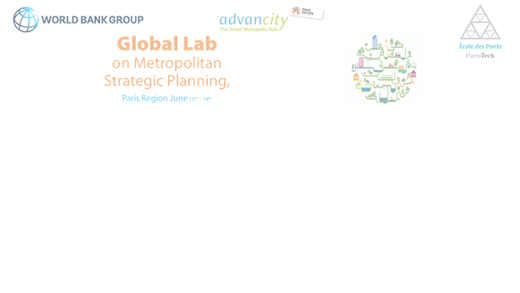PARIS, June 18, 2015 — Managing historic urban growth to create inclusive, sustainable communities is a priority for cities around the globe, and this week’s ‘Greater Paris’ regional planning efforts provided a “learning laboratory” for 100 municipal leaders from 20 countries.
The four-day Global Lab on Metropolitan Strategic Planning, or MetroLab, event was co-organized by the World Bank Group and ADVANCITY of Greater Paris. The Paris region MetroLab is the fifth in a series, preceded by Dar Es Salaam, Seoul, Mumbai, and New York.
“MetroLab is unique in that it brings together cities in all stages of development,” said Ede Ijjasz-Vasquez, Senior Director for the World Bank’s Social, Urban, Rural, and Resilience Global Practice. “It provides a platform for solutions to managing growth in a way that is not only inclusive and sustainable, but also serves to alleviate poverty and share prosperity. That’s not an easy task, and MetroLab offers support and thought leadership on urban growth to cities around the world.”
The Greater Paris venue provided mayors, urban planners, and technical experts the opportunity to learn about the region’s urban planning efforts, including site visits to École des Ponts Paris Tech to see how micro and nano-technology can be used to manage cities, a trip to the innovative and sustainable Coriolis building, and a look at sustainable urban logistics on the Seine.
“Innovation doesn’t only mean technology, although it is decisive,” said Jean-Louis Marchand, ADVANCITY Paris Region President. “Innovation can also be found in behavior changes and new services. By connecting global cities together, MetroLab enables sharing of best practices so efficient and effective urban planning tips can diffuse faster. This is exactly ADVANCITY Paris Region’s motto.”
The focus of the Paris MetroLab is how to address climate change in urban planning, aligned with topics relevant to the United Nation’s Conference of the Parties on Climate Change (COP 21), which begins in Paris on November 30th. Cities, which consume nearly two-thirds of the world’s energy and generate more than 70 percent of greenhouse gas emissions, are critical to efforts to stabilize global warming at less than 2 degrees Celsius. As cities develop, their exposure to climate and disaster risk also increases. Almost a half billion urban residents live in coastal areas, increasing their vulnerability to storm surges and sea level rise.
“Every city has unique solutions, but there are common challenges on a global scale,” said author and architect Peter Calthorpe, who delivered a keynote address on “Urbanism in the Age of Climate Change”.
In addition to discussions on climate mitigation and adaptation, participants heard from municipal leaders representing Dar es Salaam, Surabaya, Mumbai, Rio de Janerio, Amsterdam, and Kigali on innovations in urban flood, air quality, and solid waste management, as well as metropolitan perspectives on transport, land use, and urban sprawl.
The need for strategic regional planning is particularly acute in Africa. With more than 450 million urban dwellers expected by 2040, urbanization is the single most important transformation taking place on the continent.
“African cities have a unique opportunity to learn from the positive lessons and mistakes made by cities around the world,” said Ijjasz-Vasquez. “Decisions made today will define and lock the growth path of African cities. They are at a stage where they can get it right as they solve the enormous infrastructure, services, and social inclusion challenges they face."

